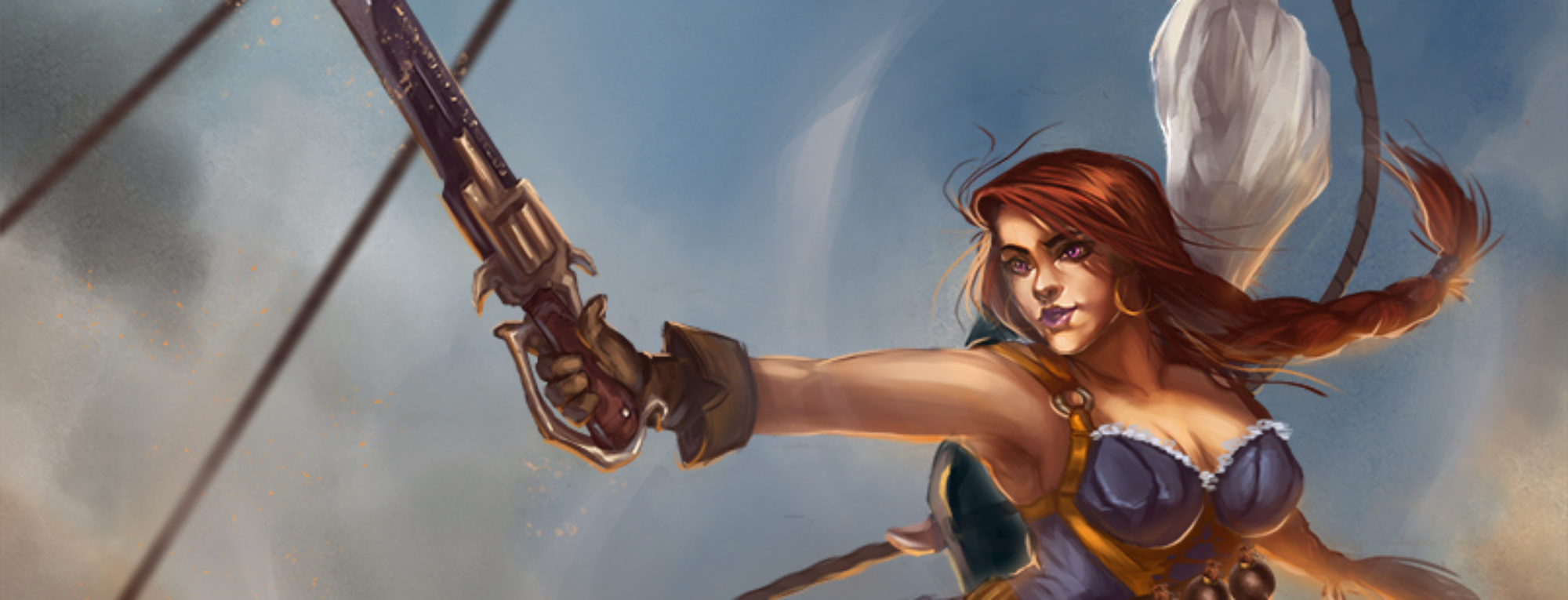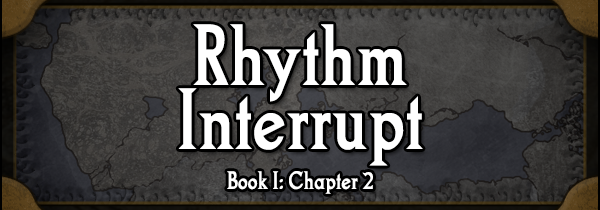Rhythm Interrupt
By ancient design, the Calibrator Assembly Hub was built to incite a sense of mindfulness. To this end, its nine ringed halls were linked by doors that opened and closed on a deliberate schedule, with only one door between each hall open at a time. Twice a day those doors aligned to create a perfect gallery, a straight shot through the whole building that allowed the rays of the rising or setting sun to brighten all the laboratories, the offices, the cells and factories.
All this was as tradition dictated, but tradition gave way to the demands of the state, and the state demanded a shortcut. Down the cold corridor of that subterranean shortcut wandered Aleksey Lockhart, young master of traps, his jacket bleached in the orange lamplight. Above and around him, the thousand clockwork mechanisms of the Assembly Hub thrummed incessantly, like a busy hive. Footsteps, too. Some tapping, some marching, some dancing, all at work.
Before long, Lockhart reached the ladder leading to the eighth ring: Execution. The trapdoor swung silently up, allowing him into a discreet alcove in the hall. Blinding sunlight streamed in from apertures overhead, forcing him to cover his eyes and navigate the way to his master’s office by memory.
Mercifully, Master Tetsuo had drawn the blinds of his skylight, lending his office the dusky quiet of a library. Racks of mechanical scrolls lined one wall, shelves of prototypes lined the other. At his desk, the old master hunched over a porcelain skull with tweezers and a screwdriver, performing adjustments. The skull was without eyes, nose, or mandible. The face was a blank white surface marked only by the six holes where the Budoka’s mask would be affixed.
“Have a seat, Aleksey,” said Master Tetsuo. “I’m afraid I’ve gotten myself a bit involved. Shouldn’t take long, but I can’t stop now.”
Lockhart smiled and sat, watching his master work. These days, not every Calibrator took on an ancient Wasu-re name when they entered the ninth ring and joined the Assembly proper. For some, it was a matter of family pride, or patriotic loyalty to the Uhrstadt. A growing number of Calibrators saw the old names as a sign of stagnation, a pitiful obedience to tradition in the face of innovation. Aleksey had to wonder if any of the younger Calibrators had really watched Tetsuo at work. The scroll unfurled on his desk was no mechanical diagram, but a sequence of poetry. Who but the ancients could derive inspiration so freely?
“I have an assignment for you,” said Tetsuo, setting his tools aside. “Directly from the ninth ring. You’ll be acting as my Proxy in this regard.”
“I’m honored,” Lockhart replied. “Another Budoka gone rogue?”
Tetsuo snapped shut the panel in the back of the skull. From within, a quiet whirring sound signaled the operation of an algorithmic clock.
“I’m afraid it’s a bit more complicated than that,” he said. “I have to warn you, Aleksey, I believe there are members of the Assembly who expect you to fail in this assignment. It may prove a supreme challenge, even for your talents.”
“Do you believe I can succeed?”
Tetsuo smiled and replied, “I have no doubt you will put the schemers in their place.”
The old master retrieved a scroll from his desk and tossed it to Lockhart.
“That’s my complete file on your target,” Tetsuo said. “But I’d like to give you the important details now. Follow me, please.”
The pair went out into the Execution hall, master leading, student following. Clouds had moved across the sun, or else Lockhart’s eyes had finally adjusted. They went counter-clockwise to find an open door, following the row of chrysanthemum tiles on the outer wall.
“The target’s original designation was T-704,” Tetsuo explained. “But it uses the name ‘Thane,’ given by its original Calibrator.”
“It’s against the law to name Budoka,” Lockhart said. “Who was the Calibrator?”
With a grim smile, Tetsuo answered: “Takezo.”
At the sound of the name, Lockhart froze in his tracks. He found himself on guard, as if in a duel, and every sense was sharp as the edge of a blade. From inside the wall he heard the time-lock mechanisms. Across the floor, the shadow of a bird flitted by in a moment.
“The heretic,” Lockhart said, meeting his master’s eyes. “The madman, Takezo? Who trained his Budoka as true duelists?”
“Thane was his masterwork,” Tetsuo said. “A perfect instrument, trained in the deadliest arts. He was among Takezo’s warriors at the collapse of the Reiser Bridge. Heretic or not, it was his clockwork duelists that overcame the superior Capulan numbers and drove back the annexation. We thought Thane was lost when the bridge burned down, but the creature has surfaced again.”
Lockhart knew the history. After the battle at Reiser Bridge, Takezo was brought to trial for disobeying the taboo against clockwork duelists. It was his case that made the taboo into law. He was exiled as punishment and all surviving Budoka from his unit were decommissioned, held now in storage and used only for mechanical study. To think that one of those warriors might have survived…
“What has it done?” Lockhart asked, dreading the answer.
“Very little, yet,” said Tetsuo. “He seems to be wandering the foothills north of here, challenging every duelist he comes across.”
“How many fatalities?”
“Zero,” Tetsuo replied, “And therein lies the problem. You see, Thane was designed to kill. He was built and trained to kill. If he isn’t killing people, what does that mean?”
Lockhart had to think for a moment.
“It means the machine is making decisions,” he said.
“Precisely. That’s due to the nature of his breakdown. Follow me, please.”
At last they came to the Calibration hall, where row upon row of tables sat waiting. Carved upon the surface of each table was a grid, nineteen lines crossing nineteen lines. About half the tables were occupied by human Calibrators facing masked Budoka, the grids between them speckled with black and white stones.
“You know that Budoka must be continually recalibrated,” Tetsuo said as they passed game after game. “Due to the gradual fragmentation of their algorithms. We track that fragmentation through games of go. Once a Budoka reaches a certain win percentage, we can be sure fragmentation has occurred.”
“Is that what happened to Thane?” Lockhart asked. “Unchecked fragmentation?”
“No, indeed,” said Tetsuo, speaking quietly. “Few know this, but there is another way to break the algorithm. Rather than an erosive series of little events leading to disorder, a Budoka may experience a singular epiphany, creating a stimulus for which the algorithm has no predetermined response. We call it the ‘rhythm interrupt.’ The result is algorithmic failure, but without the loss of reason you see in fragmented Budoka. It’s my belief that Thane experienced his rhythm interrupt at Reiser Bridge.”
Gradually, the pair wound their way around the hall. Lockhart considered the implications of a ten-year rogue Budoka. It was common to recapture a rogue within months of its breakdown, and already they were near-feral, extremely dangerous if they could remember how to hold a sword. But a Budoka trained as a duelist, operating outside the limits of its algorithm for over a decade… he had to admit his master’s faith in him was more and more of a compliment as the details of the case came to light.
“This is going to be extremely difficult,” Lockhart said.
“That’s why you won’t be working alone,” Tetsuo replied, gesturing to a table up ahead, where a crowd had gathered.
Sitting in the midst of the crowd, hunched over his grid and stones, there sat a massive man of the hills, his skin darkened by the sun, his beard wild as the great furs that covered his shoulders. Perched on his shoulder was a massive golden eagle, which cocked its head quizzically at the game in progress, as if in consideration of its master’s next move.
The mysterious player’s black stone struck the table with an impressive clack, and the play drew murmurs from the assembled crowd. His opponent was not a Budoka, but one of the Calibrators, a younger designer named Zane.
“How is our guest’s performance?” Tetsuo asked, putting a hand on Zane’s shoulder. “You seem to have taught him the rules well enough.”
“He’s unorthodox,” Zane replied. “I’m going to beat him this game, but with a little practice he could be quite formidable.”
The hillman laughed, his rough voice shocking in the careful quiet of the Calibration hall.
“Game not over,” he said. “You say ‘unorthodox’? I not know the word. But game not over. Many stones left on my side.”
Zane made his counterplay, a bid for security around a potential scoring area. Or a feint. The assembled onlookers nodded at the decision, condoning the play by their silence. But to Lockhart the move seemed timid. He examined the spread of black stones, which seemed haphazard and amateurish at first. Very little territory came under the hillman’s control, unless…
“Has this man ever played the game before?” Lockhart whispered.
“He says it’s his first time,” Tetsuo replied.
“Then he’s hustling you. Or else he’s a savant. Who is he?”
“His name is Ganzorig. He’s a hunter from the northern mountains who’s survived two duels against Thane. He knows the country and he’s offered to help us track down the rogue. You’ll be working with him on this case.”
The hillman struck again, his stone just far enough out of the way that it appeared inconsequential. But it would only take a few moves to eliminate Zane’s entire central zone.
“I not know ‘savant,’ either,” Ganzorig said. “But I think I like sound. Good name for eagle, eh?”

